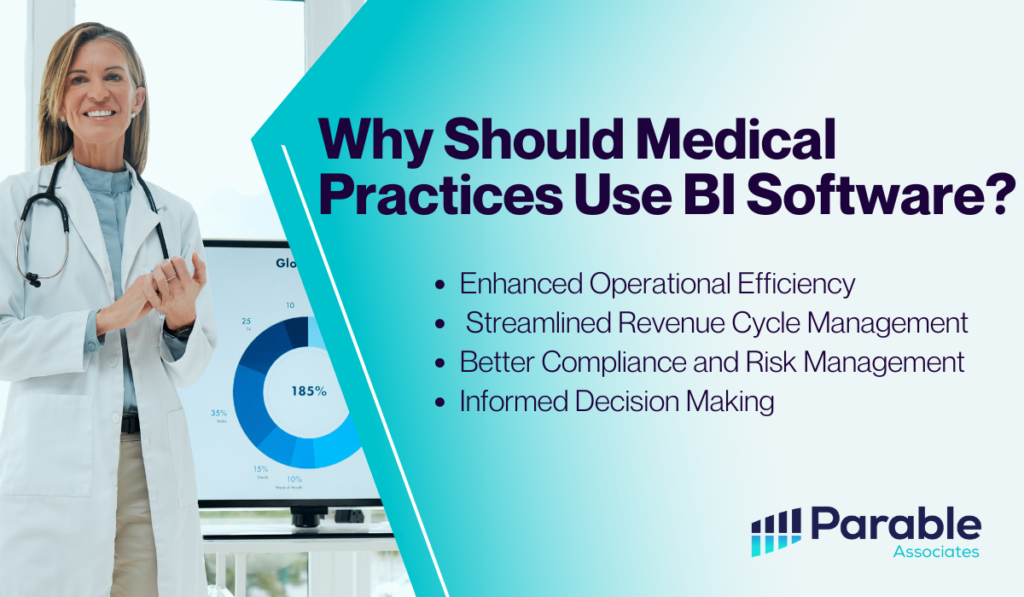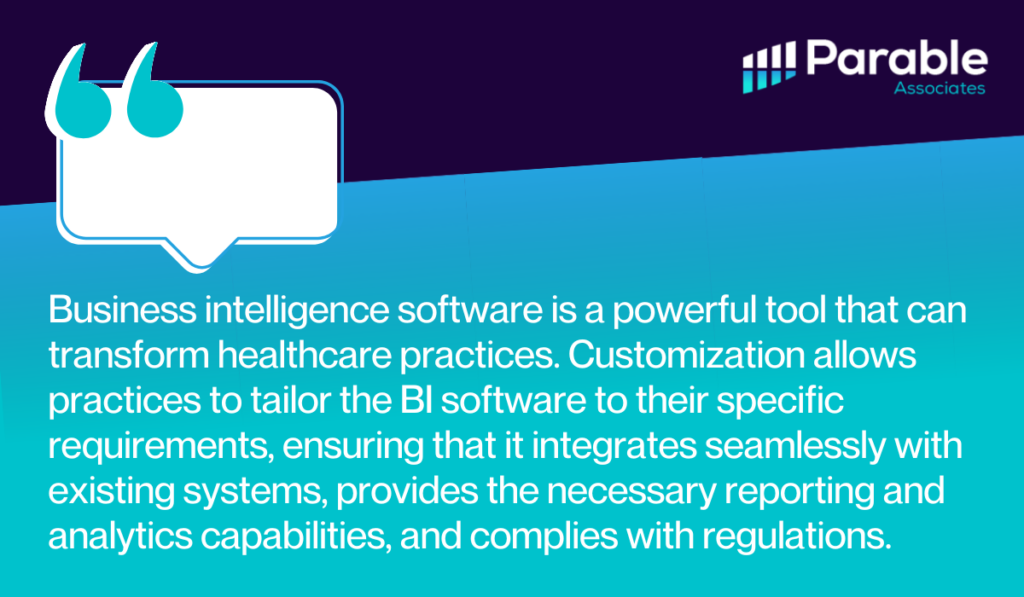In today’s data-driven world, healthcare practices increasingly rely on business intelligence (BI) software to manage, analyze, and make sense of the vast amounts of data they collect. Whether it’s patient records, billing information, or operational metrics, turning this data into actionable insights is crucial for improving clinical and administrative functions. But with many options available, one critical question arises: Is the customization of healthcare BI software necessary to maximize its benefits?
To answer that question, you need first to understand what BI software is and the benefits it can provide to medical practices. When considering the limitations of off-the-shelf solutions, customization often emerges as a vital option. It’s also important to recognize the key factors when tailoring healthcare BI software to meet specific needs.
What is BI Software?
Business intelligence (BI) software is a tool and technology suite that collects, integrates, and analyzes business data. Healthcare BI software gathers data from various sources, such as electronic health records (EHR), billing systems, and patient management systems. The software then analyzes this data to provide actionable insights to support decision-making across all aspects of a healthcare practice.
BI software typically includes features like data visualization, reporting, dashboards, and predictive analytics. These tools enable healthcare providers to track key performance indicators (KPIs), identify trends, forecast future outcomes, and make informed decisions that improve operational and financial performance.
Why Medical Practices Should Use Healthcare BI Software
The healthcare industry is becoming increasingly complex, with growing demands for data-driven decision-making, regulatory compliance, and operational efficiency. BI software offers several benefits that make it an essential tool for medical practices:
Enhanced Operational Efficiency
BI software streamlines administrative processes by automating data entry, scheduling, and billing tasks. This reduces staff workload and minimizes errors, leading to greater efficiency and productivity.
Streamlined Revenue Cycle Management
Effective revenue cycle management (RCM) is crucial for the financial health of any medical practice. BI software can track billing processes, identify bottlenecks, and optimize collections, ensuring a steady cash flow and reducing the likelihood of claim denials.
Better Compliance and Risk Management
Healthcare practices must adhere to strict regulatory requirements, and BI software can help ensure compliance by providing audit trails and monitoring for potential risks. By identifying anomalies in billing or coding, BI software helps practices avoid penalties and maintain their reputation.
Informed Decision Making
BI software provides real-time data access and advanced analytics that enable healthcare providers to make informed decisions quickly. Whether adjusting staffing levels during peak times or predicting patient admission rates, BI tools offer the insights needed to stay ahead of challenges.

Why Off-the-Shelf BI Software May Be Inefficient
While off-the-shelf BI software solutions are readily available and may seem like a quick fix, they often need to catch up when it comes to meeting the unique needs of healthcare practices. Here’s why off-the-shelf software may require customization.:
Lack of Industry Specific Features
Generic BI software is designed to serve a broad range of industries, which means it may need more specialized features for healthcare. For example, an off-the-shelf solution might not include the tools necessary to track specific healthcare KPIs or comply with healthcare regulations like HIPAA.
Integration Challenges
Healthcare practices use various systems to manage patient records, billing, and operations. Off-the-shelf BI software may struggle to properly integrate with these existing systems, leading to data silos and fragmented insights.
Inadequate Reporting Capabilities
Pre-packaged BI software often comes with standard reporting templates that may not align with a healthcare practice’s specific needs. This can result in reports lacking the depth and detail required to make informed decisions, forcing staff to spend extra time customizing reports manually.
Compliance and Security Concerns
Healthcare practices handle sensitive patient data that must be protected against breaches and unauthorized access. Off-the-shelf BI software may not have the robust security features needed to meet healthcare-specific compliance standards, putting the practice at risk.

Key Points for Customization
When considering customization of BI software, healthcare practices should focus on the following key areas to ensure that the solution meets their specific needs.
Choosing the Right BI Tool
Selecting the right BI platform is the first step in successful customization. Practices should evaluate different tools based on user-friendliness, scalability, and the ability to customize. The chosen tool must align with the practice’s needs and capabilities, providing comprehensive analytics and reporting features that support revenue cycle management. Additionally, user-friendly interfaces and robust support features are essential to encourage adoption among staff and ensure long-term success.
Identifying Goals
Before customization begins, it’s crucial to establish clear, practice-specific goals for what the BI tool should achieve. Whether the focus is on improving patient care, optimizing operational efficiency, enhancing financial performance, or all of the above, having defined objectives will guide the customization process. Identifying these goals ensures that the BI software is tailored to meet the practice’s unique needs and deliver the desired outcomes.
Defining Data Sources
Effective BI software relies on accurate and consistent data. Healthcare practices typically have data spread across various sources, such as EHRs, billing systems, and patient management software. Identifying and integrating these data sources is essential for a comprehensive revenue cycle analytics system. Customization should ensure that the BI tool can seamlessly integrate these diverse data sources and systems to deliver a unified view of practice operations, provide actionable insights and eliminate data silos that can hinder decision-making.
Reporting
Custom reports and dashboards are critical components of a successful BI implementation. Practices should develop reporting tools that align with their goals and KPIs, providing clear and actionable insights that support decision-making. Customization allows practices to create visualizations that are easy to understand and highlight the most important information, enabling staff to make informed decisions quickly and confidently.
User Interface
A customized user interface (UI) can make BI software more intuitive and user-friendly, encouraging adoption and regular use. The UI should be designed to match the skill levels and preferences of the practice’s staff, ensuring that they can easily navigate the software and access the information they need. A well-designed UI can significantly enhance the effectiveness of the BI tool and increase its impact on the practice’s operations.
Data Security
Data security is paramount in healthcare. Customizing BI software allows practices to implement enhanced security features that meet industry standards, including HIPAA compliance. This ensures that patient information is protected from breaches and unauthorized access, reducing the risk of legal penalties and maintaining the practice’s reputation.
Scalability
As healthcare practices grow and evolve, their BI needs will change. A customized BI solution should be scalable and flexible enough to adapt to future needs. This includes adding new data sources, expanding reporting capabilities, and integrating with additional systems as the practice grows.
Choosing a Partner
Customizing BI software requires expertise and experience. Choosing the right partner to guide the customization process is crucial for success. A knowledgeable partner can help healthcare practices implement and optimize a BI solution that fully meets their unique needs. They can also provide ongoing support, training, and updates, ensuring that the BI tool continues to deliver value over time.

Choose Parable Associates
Business intelligence software is a powerful tool that can transform healthcare practices. Customization allows practices to tailor the BI software to their specific requirements, ensuring that it integrates seamlessly with existing systems, provides the necessary reporting and analytics capabilities, and complies with industry regulations.
At Parable Associates, we specialize in developing customized BI solutions that allow you to improve practice and revenue cycle management for healthcare practices. Our expertise in working with platforms like Experity and Modmed includes data integration, analytics, and user training and adoption, ensuring that your practice can fully leverage the power of BI software. By partnering with Parable Associates, you can unlock the full potential of your data, leading to improved operational efficiency and tremendous financial success. Schedule a discovery call today to learn how we can help you take your practice to the next level.
Healthcare BI Software FAQs
Healthcare BI software is a suite of tools designed to collect, integrate, and analyze data from various sources within a healthcare practice. It provides actionable insights that help improve clinical and administrative functions, making it essential for data-driven decision-making in healthcare.
BI software enhances operational efficiency, streamlines revenue cycle management, improves compliance and risk management, and supports informed decision-making by providing real-time data access and advanced analytics.
Off-the-shelf BI software may lack industry-specific features, face integration challenges with existing systems, provide inadequate reporting capabilities, and fail to meet healthcare-specific compliance and security requirements.
Customization allows healthcare practices to tailor the software to their needs, ensuring it integrates seamlessly with existing systems, provides relevant and detailed reporting, enhances data security, and scales with the practice’s growth.
Selecting the right BI tool involves evaluating user-friendliness, scalability, and customization potential. The chosen tool should align with the practice’s goals, offer comprehensive analytics and reporting features, and support the unique needs of the healthcare environment. .
Key considerations include defining clear goals, identifying and integrating relevant data sources, developing custom reports and dashboards, designing a user-friendly interface, ensuring robust data security, and planning for scalability as the practice grows.
https://parableassociates.com/contact-parable-associates/Customizing BI software requires specialized knowledge and experience. Partnering with an experienced agency like Parable Associates ensures the software is implemented effectively, optimized for the practice’s needs, and supported with ongoing training and updates to maximize its long-term value. Contact us to learn more.

